Skill assessments are becoming more popular as companies seek to verify a candidate’s abilities before they extend a job offer. Skill tests are an easy way to level the playing field, provide a great candidate experience, and make hiring decisions on merit.
Yet, for small organizations — and even big companies that are hosting high-volume hiring events — skill assessments add another “thing” on the already-full plates of hiring teams. Enter: AI assessment tools.
Artificial intelligence and machine learning are now well-integrated throughout the hiring process for many enterprises. From scheduling video interviews to collecting resumes, digital voice assistants, resume parsers, and chatbots are all applying AI to improve talent acquisition.
Talent assessment tools are also employing artificial intelligence to improve talent sourcing, identify top talent, and get a more accurate picture of what a candidate can do before they get hired.
In this guide, we’ll break down some of the recent trends in AI talent assessment tools, why AI skill tests are becoming more popular, and some of the most popular AI tools that are used for screening candidates today.
What are AI assessment tools?
Assessment tools in recruiting come in many shapes and sizes. Talent assessment tools form part of the candidate screening process and can include things such as resume parsing, background checks, phone screens, or skill testing.
Pre-employment tests and skill assessments are the most common talent assessment tools that use AI. Artificial intelligence (AI) assessment tools use machine learning to evaluate a candidate’s experience and qualifications as they relate to the job description. Ultimately, these assessment tools help recruitment teams understand a candidate’s current knowledge and ability, versus the historic nature of resumes — which are a bad proxy for expertise.
Why are AI assessment tools rising in popularity?
There are a number of reasons why AI is a valuable resource for hiring teams. AI helps improve a range of recruiting outcomes: shortened time-to-hire, reduced bias in the hiring process, lower candidate and employee turnover, and ultimately, better job performance.
Pre-employment screening remains the biggest drain on recruiter resources. Recruiters receive hundreds, if not thousands, of applications for each open position. Resume screening tools can help screen potential candidates, weeding out spam or those who are completely unqualified for the role. However, that still leaves recruiting teams with hundreds of applications to assess.
AI speeds up this process. AI assessment tools have the potential to rank candidates based on how well they performed, creating an automatic shortlist of suitable applicants. The best AI tools provide hiring managers with a list of qualified candidates based on how well they answered questions, in line with your example of ideal answers. There’s little manual effort needed to generate this initial ranking — no grading, reviewing answers, or watching pre-recorded videos required. And from there, some tools will prompt you to grade some answers manually and adjust the ranking accordingly.
With this list, recruiters can prioritize their outreach to the most qualified candidates, improving the candidate experience and shortening the overall recruitment process. AI can automate aspects of candidate engagement: scheduling interviews, communicating next steps, and performing other administrative tasks around skill-based assessments.
Finally, AI assessment tools can help reduce human bias, focusing on critical competencies rather than education and keywords listed on a resume. Hiring managers are often forced to use heuristics to screen candidates, using education or age as a proxy for experience.
[Read more: How To Prevent Unconscious Bias From Ruining Your Culture and Diversity]
When set up properly, AI assessments overcome unconscious bias and find the best candidates based on performance. Human resources teams benefit from talent acquisition that prioritizes skills and matches job postings with people who can succeed in the role.
What to look for in AI assessment tools

There are many different types of AI tools, with various pricing models and features, that can help hiring managers assess candidates. In determining which is right for your talent acquisition process, consider some of these questions.
1. What roles are you hiring for?
Some jobs are better suited to certain assessment methods than others. Software development or a technical role that requires specific knowledge is an easy example. Sales, customer service, copywriting, and even admin roles can be filled using a talent assessment tool.
2. What skills does the role require?
In addition to understanding which roles you need to design an assessment for, it’s also helpful to know the qualifications for that role. Yes, that includes skills listed in the job descriptions, but it also requires looking at the big picture. Does this role require leadership? What impact will this role have on company culture? How will this role influence future hiring decisions?
3. What personality traits are important?
A candidate’s personality can’t be communicated through a two-dimensional resume, But, many AI tools can use natural language processing, video interviewing, and out-of-the-box job-related tasks to get a better sense of a candidate’s personality.
4. Does the tool provide evidence-based proof?
The main benefit of using an AI assessment tool is that it matches job seekers that are qualified and suitable for the open position. These tools should feasibly predict job performance with a high success rate, lowering employee turnover and finding the right employee the first time.
5. Does it reduce the risk of human biases?
Used ethically, AI is a tool for good that provides powerful, bias-free data points. However, it’s also true that machine learning is susceptible to human hiring bias introduced through the data set. Vet your AI assessment carefully to make sure it isn’t replicating some of the flawed decisions human hiring managers make by accident.
[Read more: Good AI, Bad AI, and How To Avoid Hiring Bias In Machine Learning]
6. Does it integrate seamlessly?
Last but not least, an AI assessment tool is meant to save time, not create more manual work. It should take some of the most repetitive tasks off the plate of your recruiting teams and automate time-consuming aspects of the recruitment process. Therefore, it should sync easily with your other recruiting software, such as your applicant tracking system and job board, if applicable.
As you review some of the popular AI assessment tools in the list below, keep these questions in mind. They can help you identify a recruiting tool that matches you with the right candidate for your next hiring cycle.
The 14 best AI assessment tools to help you hire
These AI assessment tools can help businesses vet and find their next great employees.
1. Vervoe
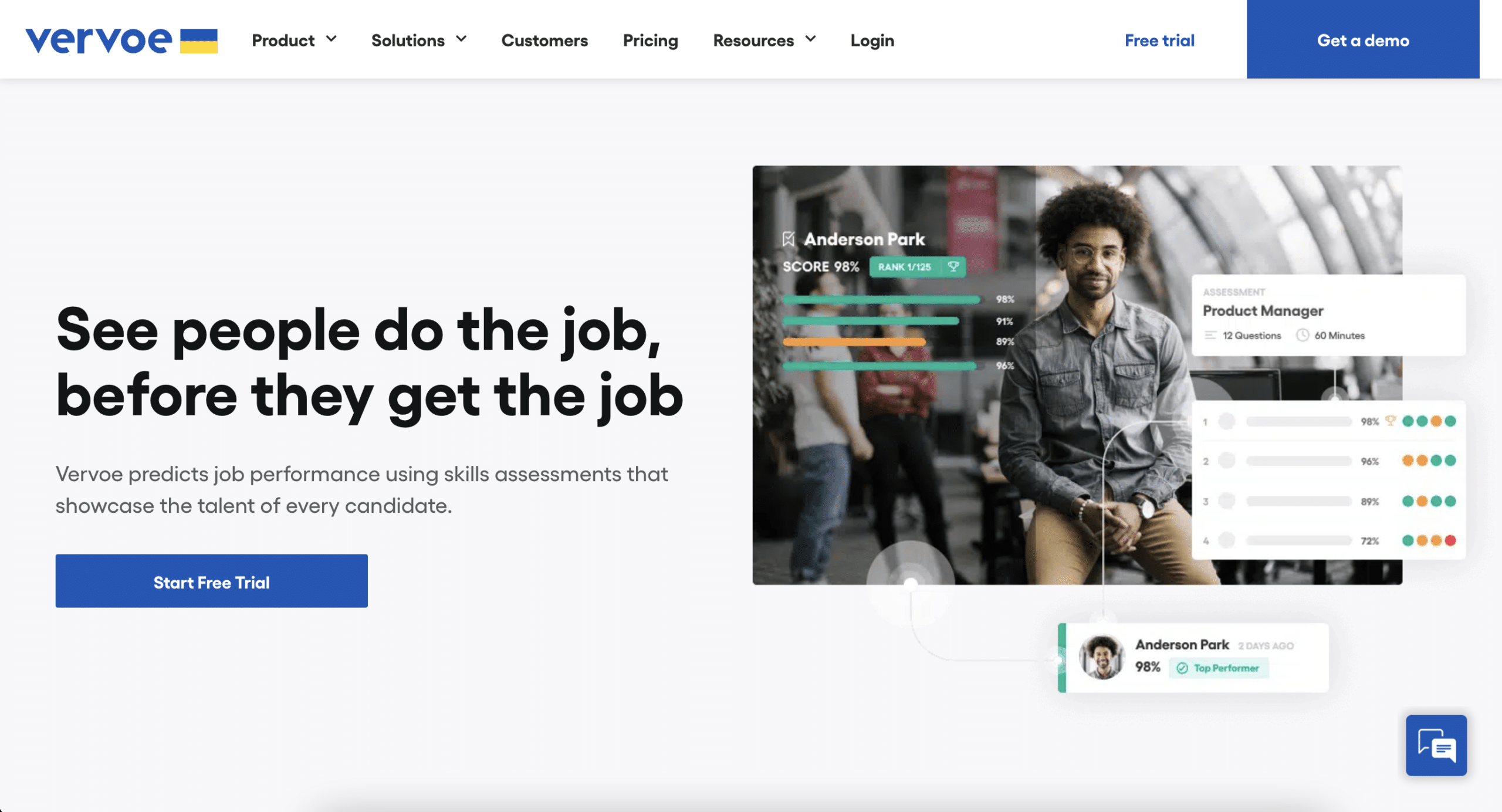
Vervoe’s mission is to help recruiting teams see if a candidate can do the job before they get the job. To do this, Vervoe’s artificial intelligence uses three different models to measure and predict a candidate’s performance:
- The “How” model: the AI tracks and analyzes the way a candidate interacts with the assessment, recording metrics such as how long it takes for someone to answer a question or if they go back to make revisions.
- The “What” model: the AI analyzes the candidates’ responses and benchmarks them against millions of others. Natural language processing helps the AI analyze those answers, which are compared to existing blind data sets.
- The “Preference” model: the AI is trained to understand what a great answer looks like to your business and according to your preferences. It uses the Naive Beyes method to predict probability.
Vervoe is nearly industry-agnostic: it can be used at companies of all sizes for graduate hiring, high-volume hiring, technical hiring, remote hiring, and diversity hiring. And, Vervoe offers assessment questions tailored to specific roles in marketing and advertising, customer service, healthcare, retail, and more.
Pricing starts at $109 per month and includes access to Vervoe’s content library, candidate report cards, and tools for tailoring assessments with your company’s branding.
Begin a free trial today or get a demo to see what Vervoe can do for you.
2. Harver

Harver offers a range of solutions, including pre-employment assessments. Harver’s assessments are grouped into four categories: hard skills, such as a typing test or language test; cognitive ability, such as a learning agility test; behavioral, such as a virtual interview or personality questionnaire; and job fit, such as a situational judgment test.
Harver’s assessments aren’t tailored to specific roles the way Vervoe’s are. Instead, Harver assigns an IO-psychologist to work with your company to create an ideal candidate profile and determine the key characteristics for success. Then, its matching framework uses performance feedback loops to optimize over time.
Harver’s 15+ assessments are part of its larger suite of tools designed to help manage high-volume hiring events. They offer an end-to-end solution that can handle collecting applications, screening, matching, interviewing, and hiring.
They don’t list their pricing online but do offer a demo. Capterra recommends Harver for consumer brands, retail, customer service, hospitality, and more.
3. Pymetrics
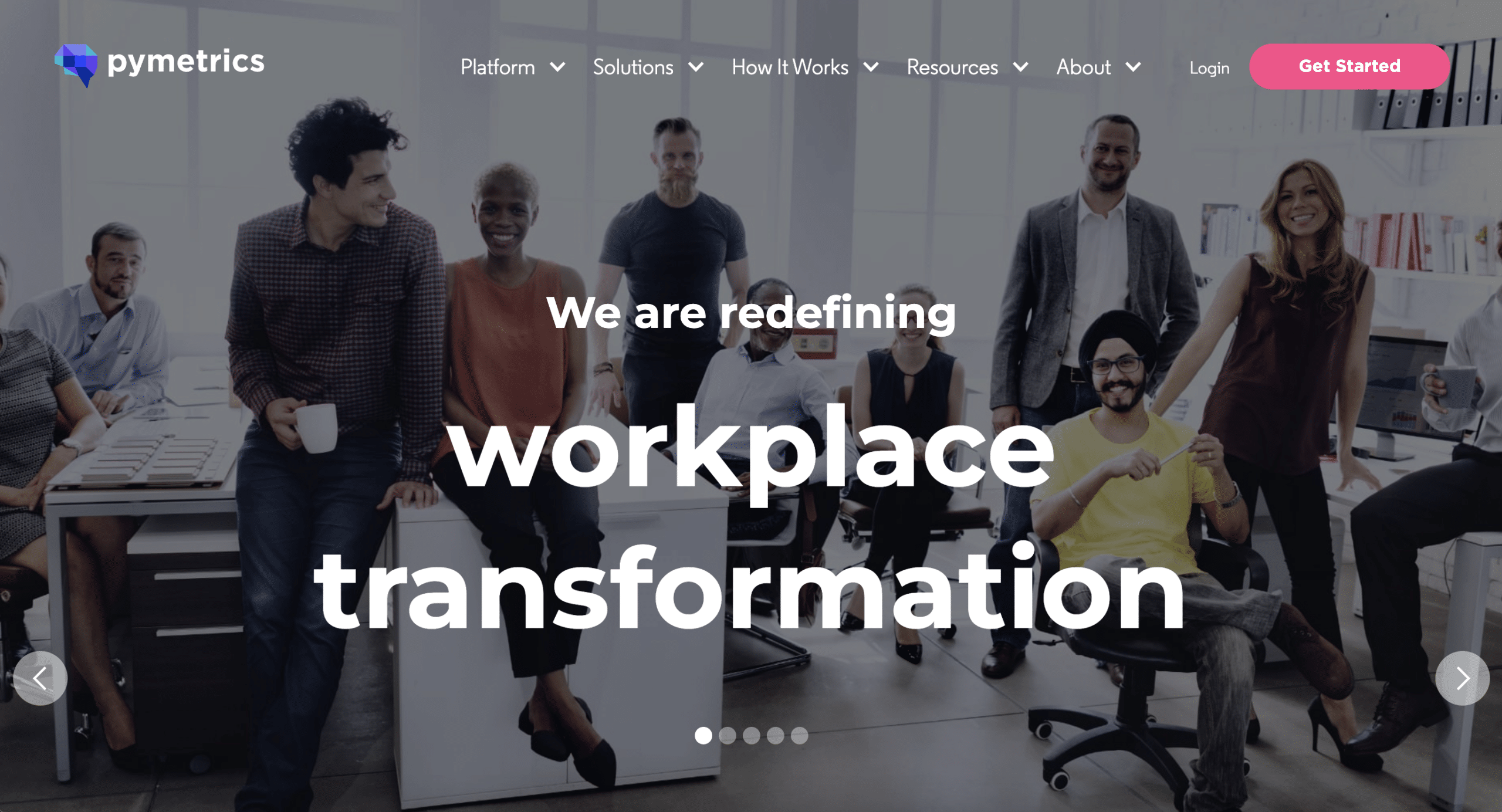
Pymetrics “gamifies” pre-employment skill testing. This AI tool offers your existing employees a series of tests that mimic video games. The algorithm uses their results to build a persona of a potential new hire who would fit an open position, based on your employees’ results. Candidates can then take similar tests to see if they are a good match.
Pymetrics offers 12 engaging games that aim to measure cognitive and emotional attributes. One of the biggest pros to using Pymetrics is that these games only take about 25 minutes making it likely they’ll complete this shorter task, compared to a more detailed questionnaire. In addition to these core games, Pymetrics also offers numerical and logical reasoning assessments and a virtual interview tool that builds on their gamified assets.
Pymetrics skill tests examine traits like effort, risk tolerance, and decision-making. A potential risk to using this tool, however, is replicating any biases that may currently exist in your active workforce. Since the AI tool uses current employees as the baseline for future hiring decisions, it’s possible that it will simply choose candidates who fit an existing mold, rather than improve diversity.
This company also offers specific solutions for hiring hourly employees and campus recruiting. Companies like Boston Consulting Group, Colgate-Palmolive, The Kraft Heinz Company, and McDonald’s use the tool. Their pricing is not publicly available.
4. PredictiveHire
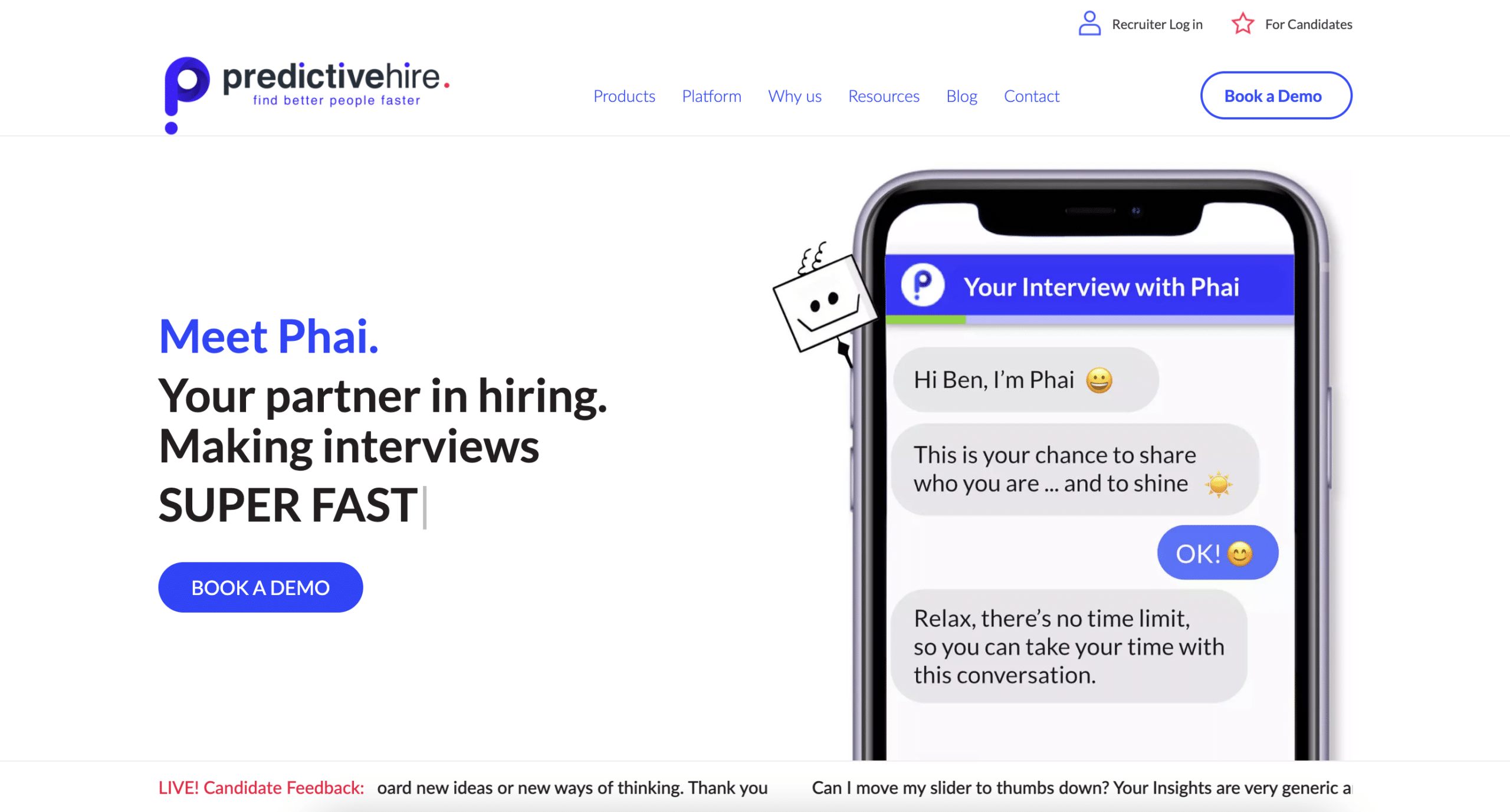
PredictiveHire is slightly different from the previous tools on this list. This company’s AI focuses on the interview portion of talent acquisition. PredictiveHire’s AI tool conducts top-of-funnel interviews via video, chat, or via group interview format, saving time for recruiting teams. Everyone gets the same interview, anywhere, anytime, and untimed, leveling the playing field.
PredictiveHire helps recruiters identify top candidates faster, taking care of the early-stage screening steps of the talent acquisition process. The chat tool “Phai” uses neuro-linguistic programming (NLP) to assess candidates for values, traits, personality, etc. Candidates are scored, ranked, and benchmarked against the market. The platform can then invite shortlisted candidates to video interviews automatically — which is, again, hosted by AI.
The downside of PredictiveHire is its lack of focus on testing on-the-job skills. This tool only focuses on the interview portion of the recruitment process. Like resumes, interview performance is often a poor predictor of on-the-job success. In addition to this, candidates hardly ever interact with someone from the recruiting team or a hiring manager during the PredictiveHire process. And the few question types on offer aren’t immersive or deep, making it unlikely this tool will accurately predict performance.
PredictiveHire doesn’t provide public pricing.
5. myInterview
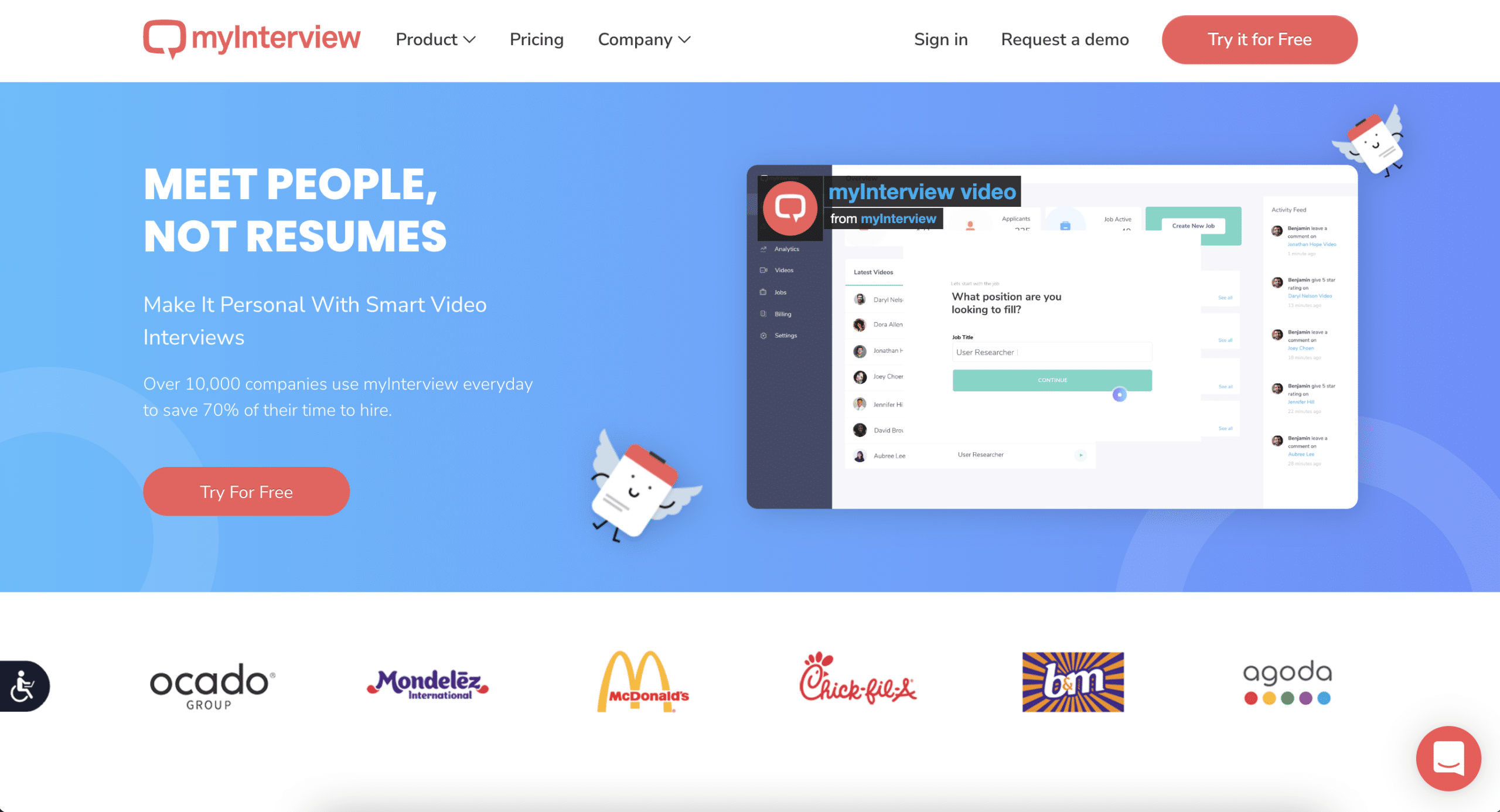
myInterview uses AI to analyze video interviews and create candidate shortlists based on soft skills, personality traits, and keywords. Your hiring team selects the qualities you need for the role: things like “team player”, “optimistic”, or “creative”. myInterview understands keywords or specific industry terms in addition to personality traits and it uses a business-focused personality model based on the Big Five.
Candidates are invited to a one-way video interview on the myInterview platform. The tool’s AI analyzes their video and creates a shortlist for you and your team to review. It also offers a transcript of the video interview. Then, a hiring manager can schedule a second-round live interview with the top candidates through the myInterview platform (or perform one in-person or on separate video software).
Perhaps the biggest draw of myInterview is that many of its tools are free for up to 10 interviews per month. These include features, such as question retakes, adjustable time limits, and SMS/text invite functionality. But the big downside to myInterview is that its AI tool is only available on the paid version, which starts at $279 per month. This means you’ll have to grade video responses manually in the free tier, increasing your workload along with the potential for unconscious bias.
If you do choose to go with the paid version, consider the risk of using AI to screen video content. Analyzing facial expressions is one way to replicate unconscious bias in artificial intelligence. Make sure you are able to set up the tool to focus on matching skills, rather than appearance.
6. CodeSignal
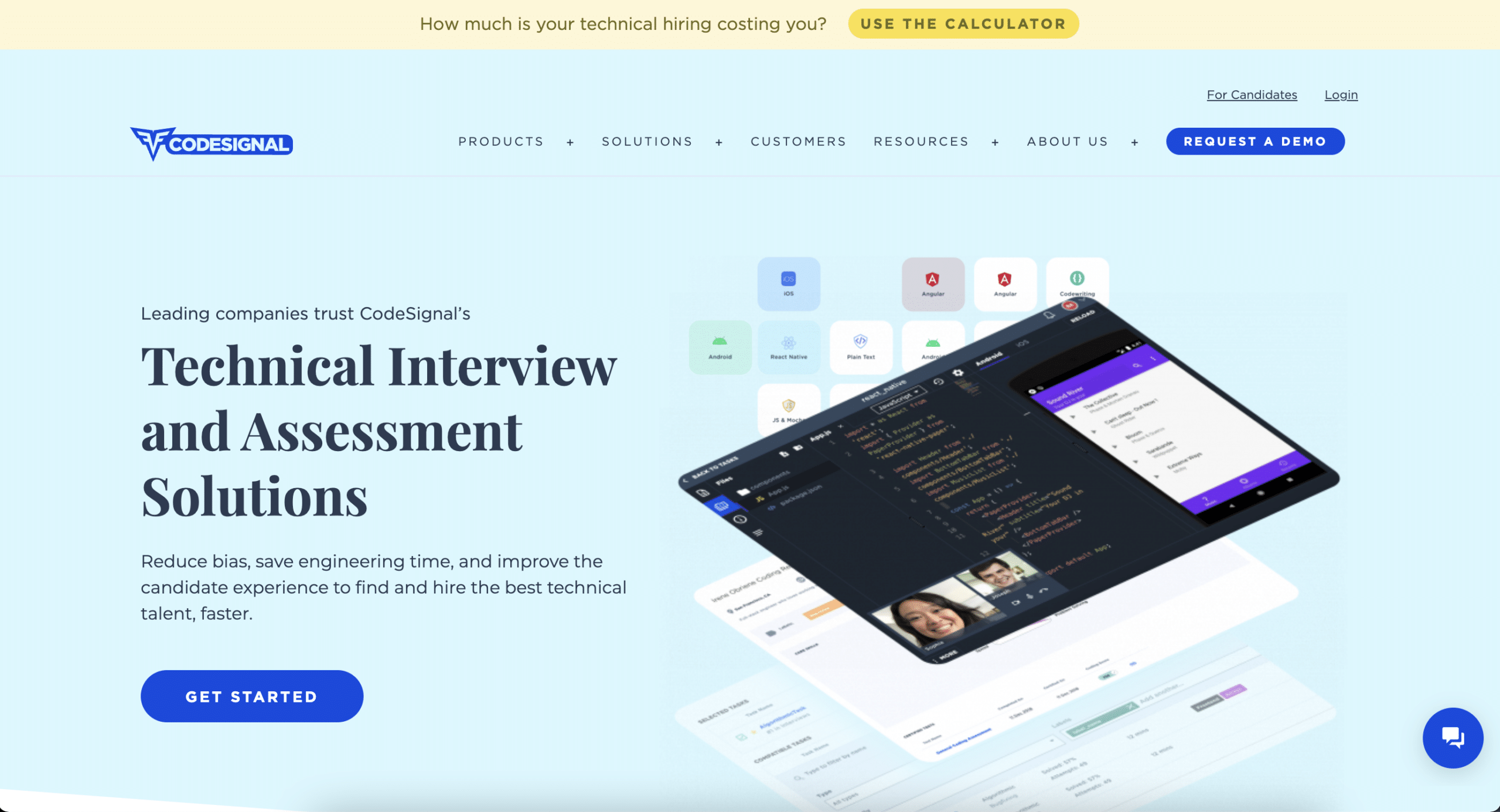
CodeSignal specializes in pre-employment assessments for engineers and software developers. CodeSignal’s “Coding Score” is an automated score that provides an objective measure of each candidate’s coding skills. This model looks at four factors: correctness of the solutions; implementation ability; problem-solving ability; and speed. As an added benefit, CodeSignal vets the score before providing it to your team to ensure that no “unusual activity” took place during the assessment.
CodeSignal relies on automation to score the assessments, but interview questions are developed by technical assessment experts and validated by a team of Ph.D. IO Psychologists. If you choose to offer a tech screen, versus a pre-screen, a live person from CodeSignal will help provide a great candidate experience while winnowing down job seekers to those best suited for the interview process. CodeSignal’s score automation is calculated based on averages like the number of tasks solved fully correctly, or average speed per coding task, but is not powered by AI.
CodeSignal does not provide public pricing. It’s used by big brand customers such as Uber, Asana, Postmates, Gusto, and Zoom.
7. HireVue
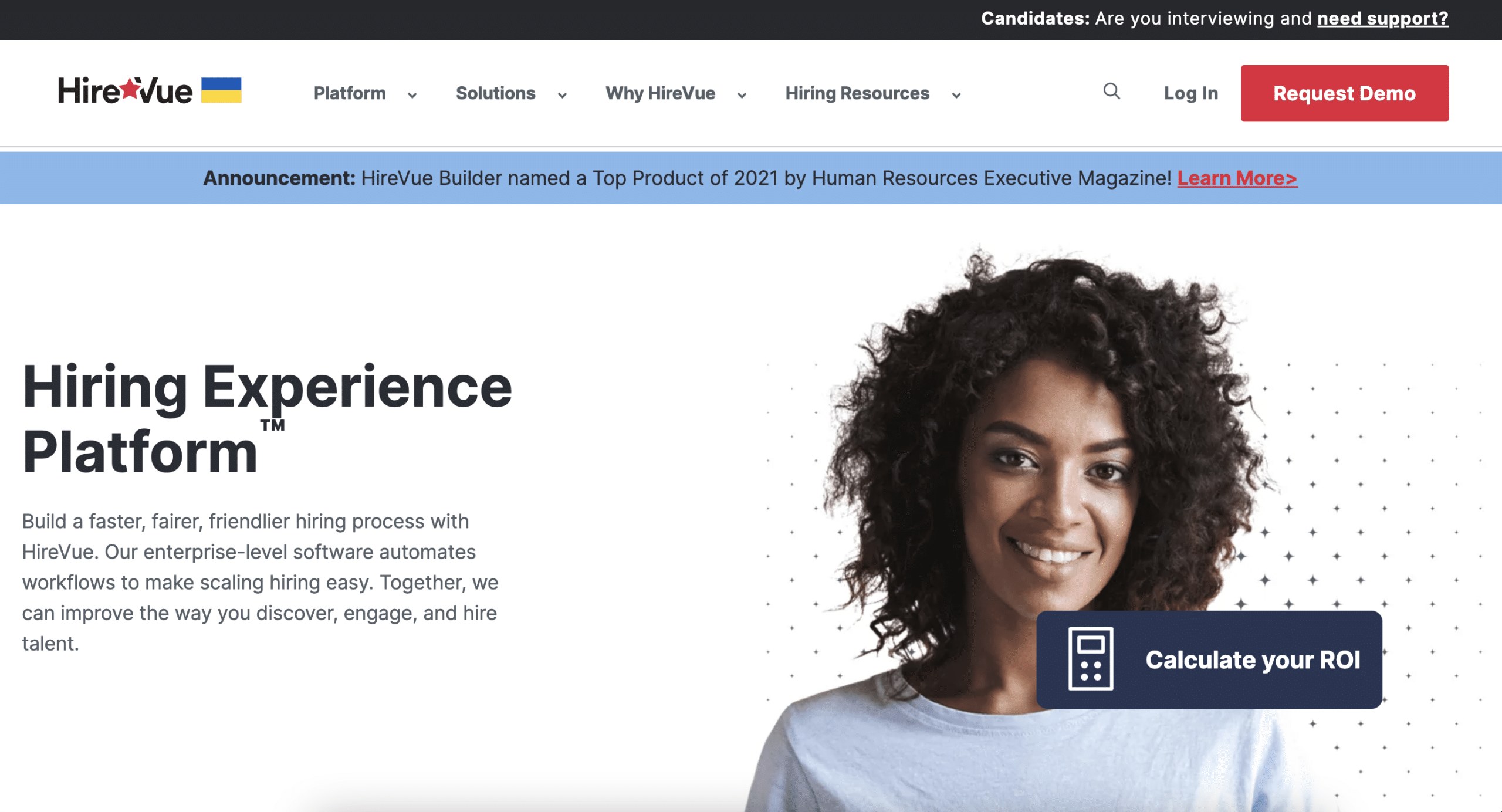
HireVue has a variety of video interview, game-based, and coding assessments. Use this recruitment software to mix and match different types of questions: assessments can be set up to measure soft skills, hard skills, and general competencies.
HireVue offers three different options. Video interview assessments are designed to be used early in the screening process, taking up to 20 minutes for the candidate to complete. Conversational AI via SMS and WhatsApp takes care of the scheduling and setup of the entire experience. Game-based assessments offer metrics for a recruiter to understand individual cognitive skills and behavioral traits related to job performance. And finally, coding assessments go beyond a simple coding task to reveal a candidate’s ability to problem-solve and communicate.
While the platform offers a range of recruiting solutions that integrate with your ATS and other technology, HireVue doesn’t offer AI grading, team and guest grading options, and lacks some functionality such as the ability to upload documents, spreadsheets, and presentations.
With pricing starting at $35,000 for organizations with 2,500-7,500 employees, HireVue is requesting a large investment. And yet this “Essentials” package lists its most unique features — the conversational AI chatbot and sourcing tools — as add-ons. It’s unclear on the website how significantly adding these features would change the price.
And with no AI grading, it’s up for debate how well the platform can help companies scale their hiring, and reduce bias, particularly when reviewing video interviews.
8. nTalents
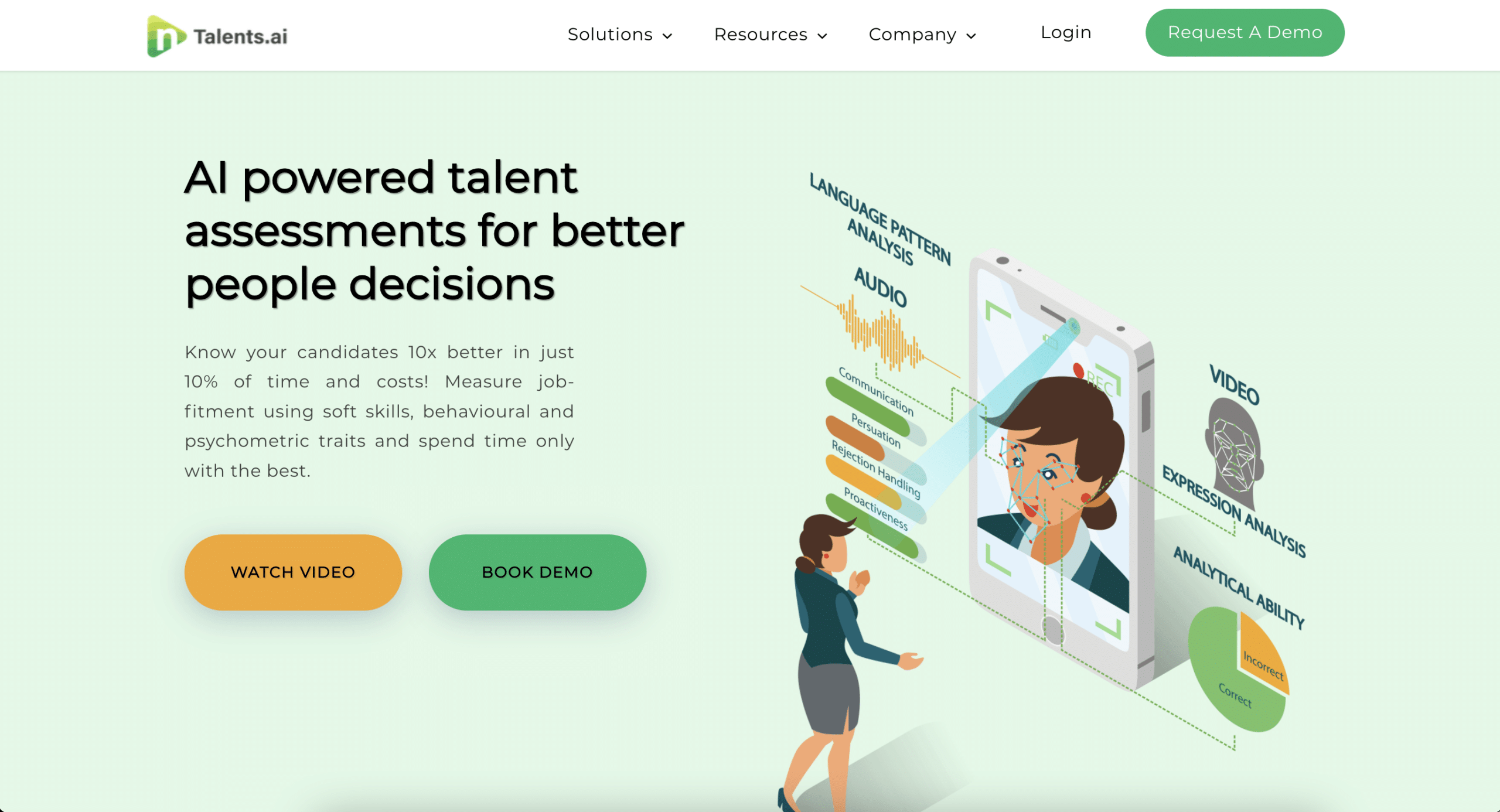
nTalents is primarily an AI company that has applied its technology to recruitment. nTalents’ uses AI and psychometrics to capture subjective responses, claiming to deliver three times more accuracy than any other traditional assessment.
One of the biggest advantages to using nTalents is the library of industry-specific questions this company has to offer. Select questions tailored for sales, the pharmaceutical industry, leadership and managerial positions, corporate roles, and more. This recruitment software also offers questions designed for different levels of expertise, such as a regional sales manager vs. an entry-level account manager.
The questions set by nTalents are rigorous. “We do attribute-based screening through a comprehensive and holistic evaluation. Our aim is to make sure not even a single minute of your interview time is wasted on incompetent and uncoachable candidates”, says the company’s FAQs.
nTalents is perhaps best suited for companies that are seeking to scale and hire at volume. It provides a standardized way to assess applicants quickly and with minimal bias. There is no public pricing on the nTalents website.
9. Sprockets
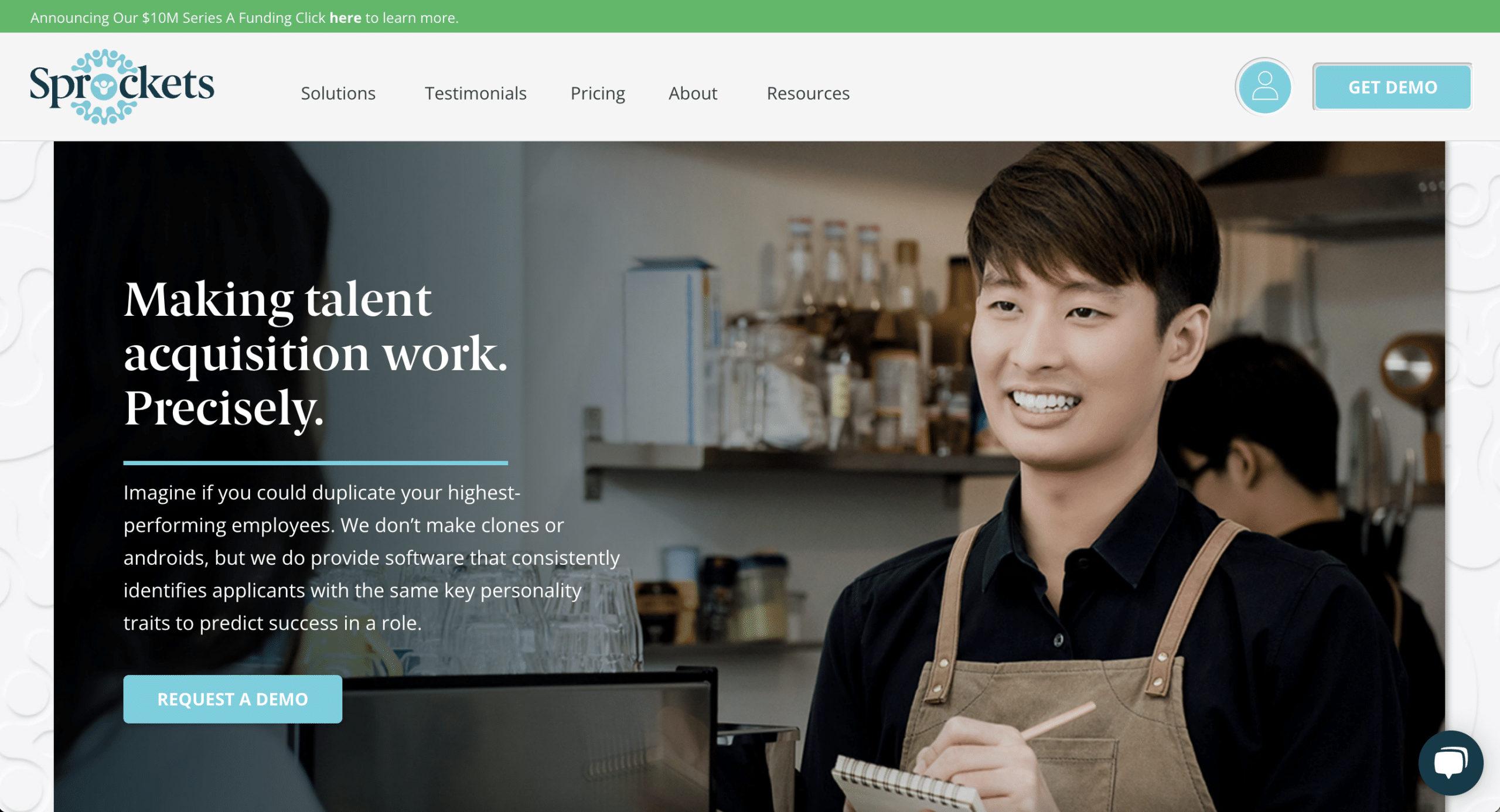
Sprockets aims to reduce employee turnover by using AI to predict performance. The tool sends a short survey to top-performing staff. Their responses are used to develop a “Success Profile” for each role. When you start hiring for a certain position, new applicants will receive the same short survey. Their responses are scored out of 10, giving you a dashboard of ideal fits, “potentially decent hires”, and those who aren’t qualified.
Sprockets’ AI uses IBM Watson Personality Insights to assess applicants via NLP. It looks for the Big Five personality traits as well as 30 other workplace-relevant values. Candidate profiles are benchmarked against existing talent to find similar qualities in similar proportions.
On one hand, using your current job profiles can be a good way to build on the best talent you already have. On the other hand, this approach runs the risk of replicating skills you already have; there’s no room to diversify skill sets, bring in new approaches, or source new perspectives.
Sprockets works with companies in a variety of industries, including hospitality, quick-service restaurants, retail, fine dining, sales, and more. As such, their pricing is based on the number of business locations using their solution. Pricing starts at $89/month for users with more than 50 locations.
10. Zappyhire
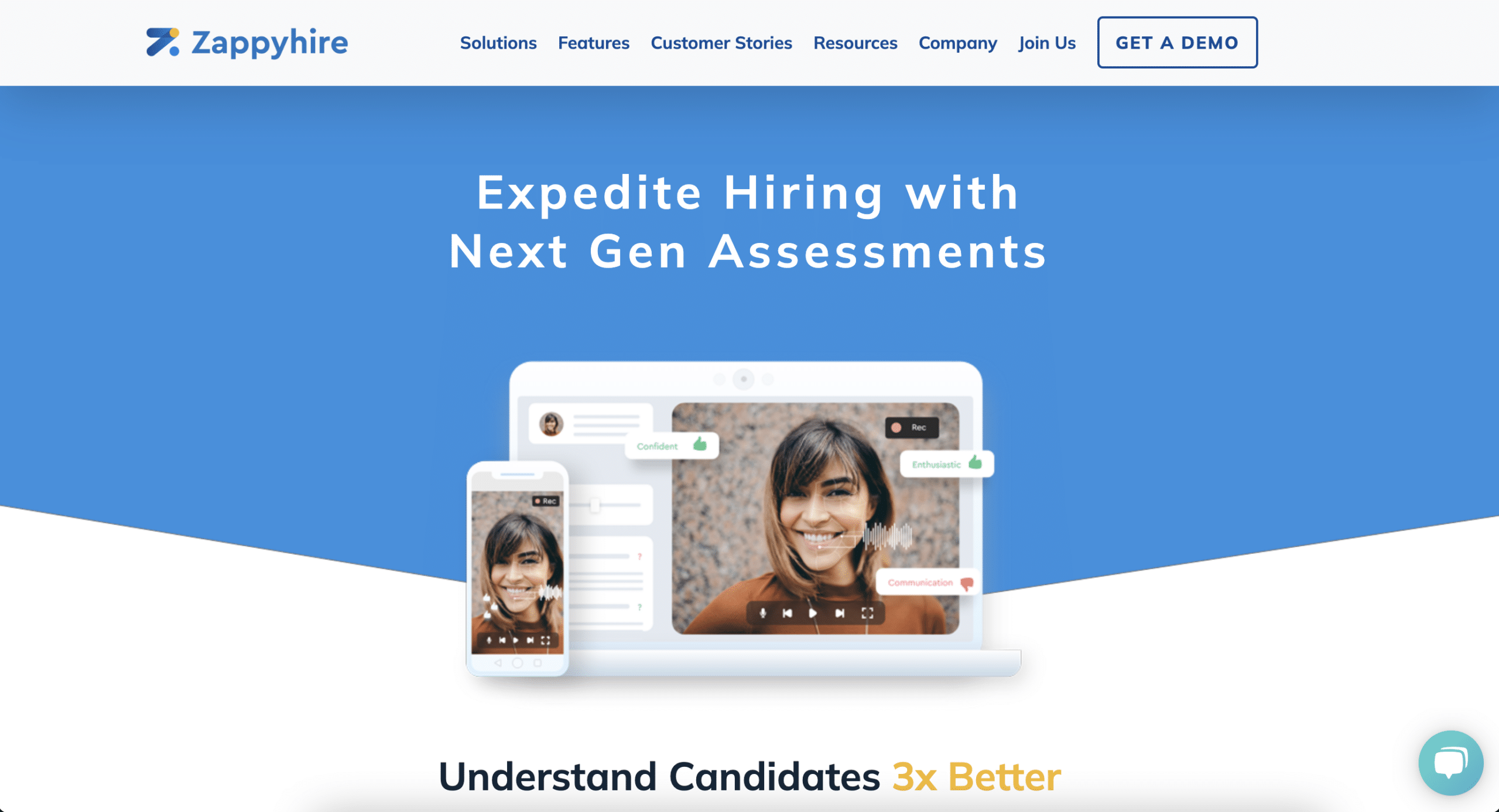
Zappyhire’s tools include digital assessments, AI-enabled video interviewing, and gamification. Its range of solutions helps recruiters by providing a personal traits report generated from an AI-guided interview. Likewise, its assessments tool creates a gamified environment that simulates a real workplace scenario, measuring competencies related to the job profiles. Zappyhire’s assessments can be built for each role using game theory — which helps recruiters see who is the best fit and keeps candidates engaged.
One interesting feature of Zappyhire is that it also allows recruiters to connect third-party assessments. Hiring teams can use assessments from Zappyhire’s library, link an existing assessment partner, or configure elements from different assessments into a custom build. This makes it easy to integrate the tool into your existing systems.
Zappyhire is not just an assessment tool; its AI can also be used to parse resumes and as a chatbot. Pricing for this recruiting software starts at $39/month.
11. AssessFirst
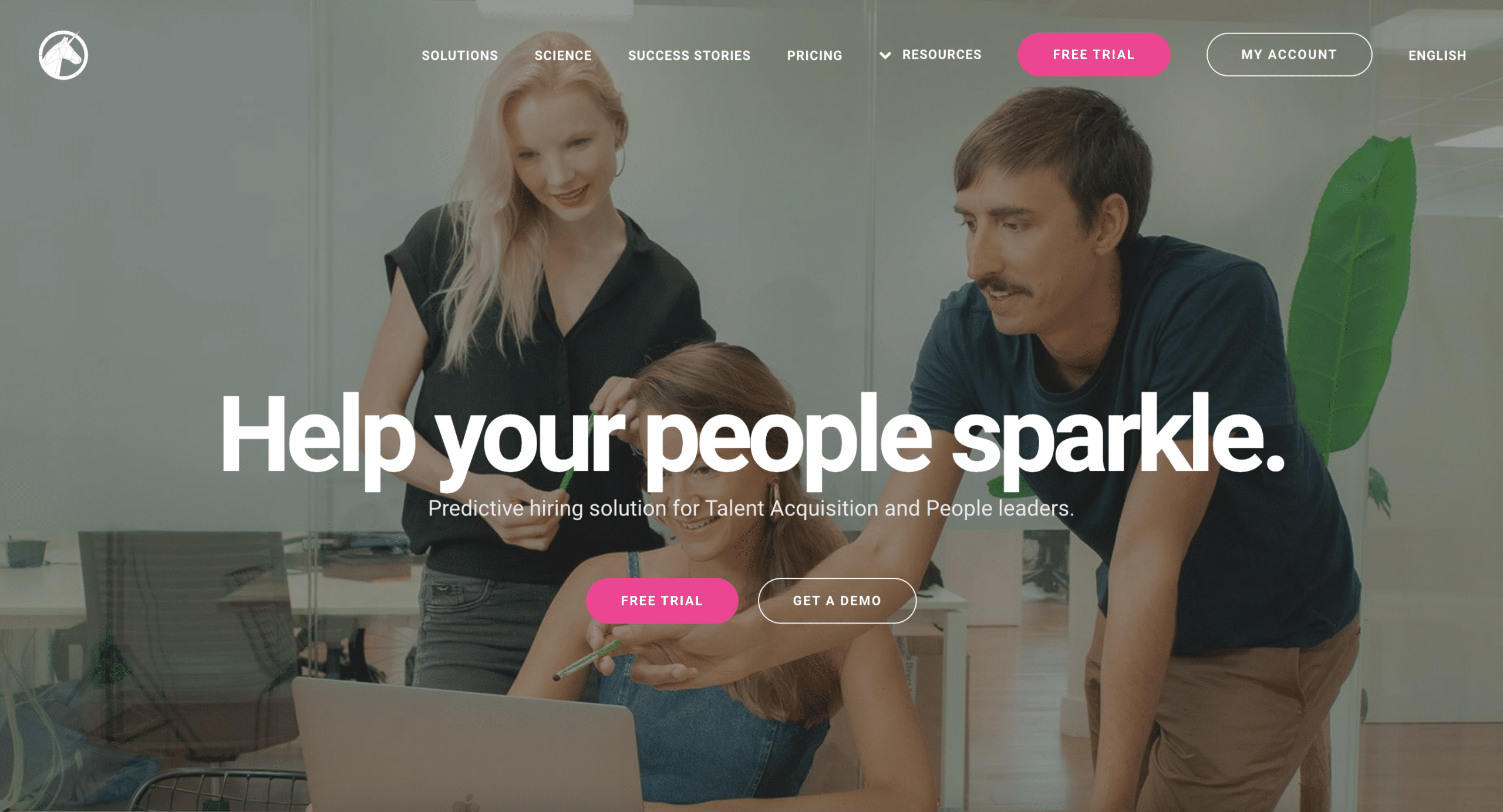
AssessFirst offers a “build your own algorithm” AI tool that your HR team can use to find employees who fit your unique company. The main focus of its assessments is not job readiness, however, but traits related to people’s personalities, motivations, and cognitive skills.
AssessFirst analyzes over 200 criteria; companies that work with AssessFirst can build their own profiles using 50 criteria or use the brand’s proprietary AI to identify the criteria that determine success and engagement by assessing your current workforce. Either way, AssessHire claims to be able to remove bias from the equation, using “affinity algorithms” to predict fit and find someone who will succeed in the long run.
The biggest downside to using AssessFirst is its focus on personality traits, rather than job readiness. While these types of assessments can be useful to assess candidates for leadership positions and roles like sales or customer service — where interpersonal skills are important — these assessments are unlikely to give you insight into someone’s hard skills.
AssessFirst offers tools for the entire employee lifecycle, not just in talent acquisition. Pricing starts at £190 per month.
12. Bryq
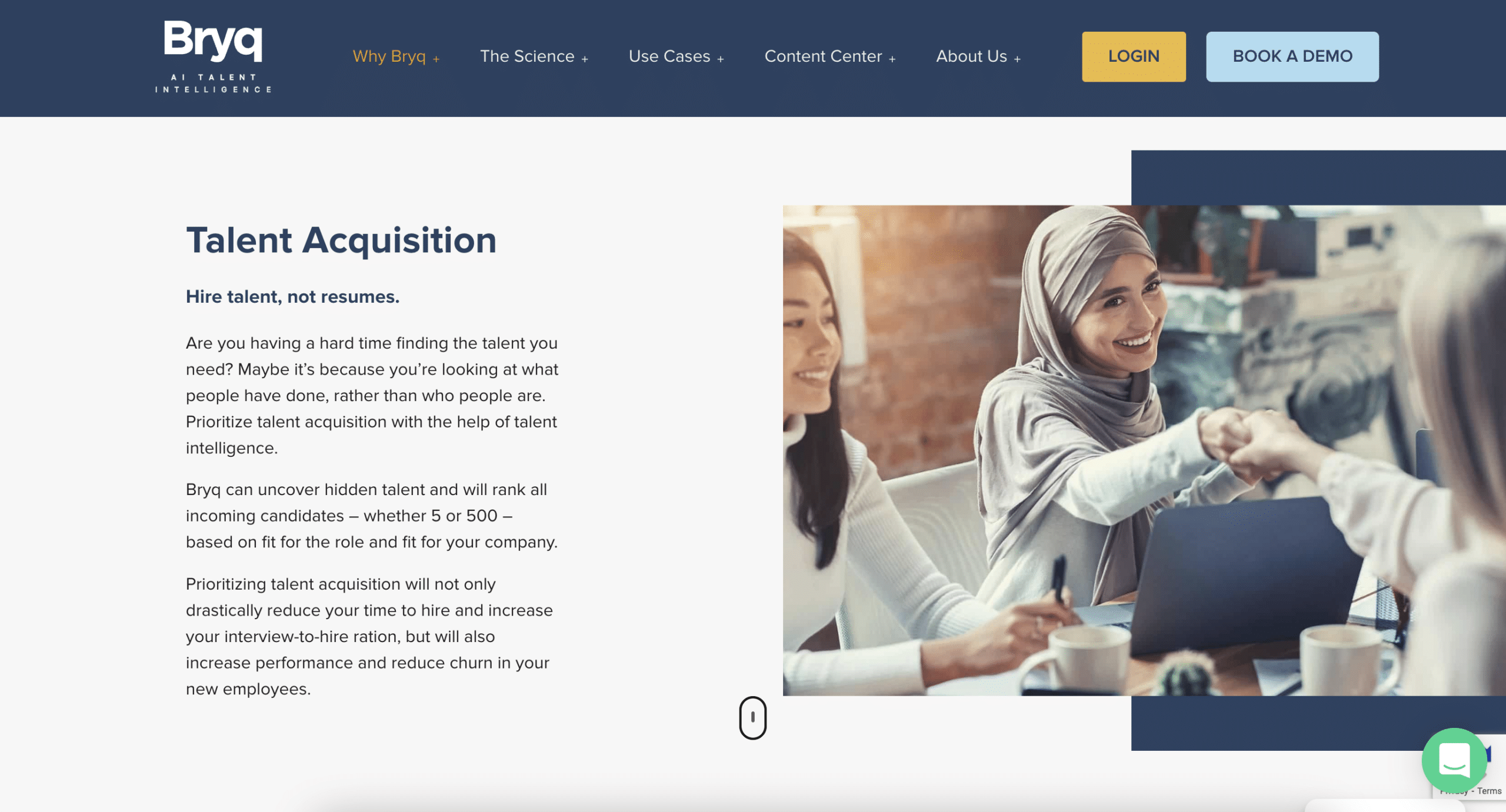
Bryq offers a similar tool to Vervoe; it manages high-volume hiring events by offering assessments scored by AI, delivering your HR team a shortlist of qualified candidates based on their test performance. Bryq ranks candidates based on their assessment score and job fit. Its assessments are defined by an ideal candidate profile based on each job description, as well as I/O Psychology science.
Bryq also emphasizes DEI in its recruitment software. The brand asks hiring teams to submit unique “Cultural Pillars” which help to identify the candidates that will strengthen your current team and add to your company culture. Likewise, Bryq’s tool claims to go to “great lengths to not impact any of the protected classes.”
Unfortunately, like AssessFirst, Bryq primarily measures psychographics, rather than job readiness. Its machine learning assesses traits like emotional intelligence, resilience, and communication: important skills, but also generalist candidate data that can’t necessarily prove they have the hard skills to succeed. And, as part of the recruiting process, Bryq does not offer bespoke reporting to help you improve your recruitment.
Bryq does not publish its pricing, but it does offer a free 14-day trial.
13. Cangrade

Cangrade uses 50 psychometric variables in its pre-hire assessments, which leads to its ability to predict candidate success up to 10x more accurately than any other hiring method. This seems like a lot of variables, yet Cangrade’s assessments take an average of 14 minutes. Cangrade’s AI helps recruiters by narrowing down the pool of applicants quickly, objectively, and accurately.
Cangrade focuses on psychometrics rather than job skills. It measures soft skills using its “Success Models”, which ask questions targeting traits like efficiency, focus, self-confidence, and public speaking. Cangrade is clear about using its recruiting software early in the process. It integrates with other recruiting tools to help manage the entire hiring process seamlessly.
One nice feature of Cangrade is that candidates can request to see their pre-hire assessment results. With this feedback, applicants can improve their candidacy at other companies and further develop their skills in the job market. This helps build your employer brand and encourages future engagement.
Assessments aren’t the only thing that Cangrade offers: it also has tools for video interviews, remote onboarding, upskilling, and managing promotions. Cangrade doesn’t list pricing publicly, but it does offer a version for small businesses that is likely more affordable.
14. Hire Success
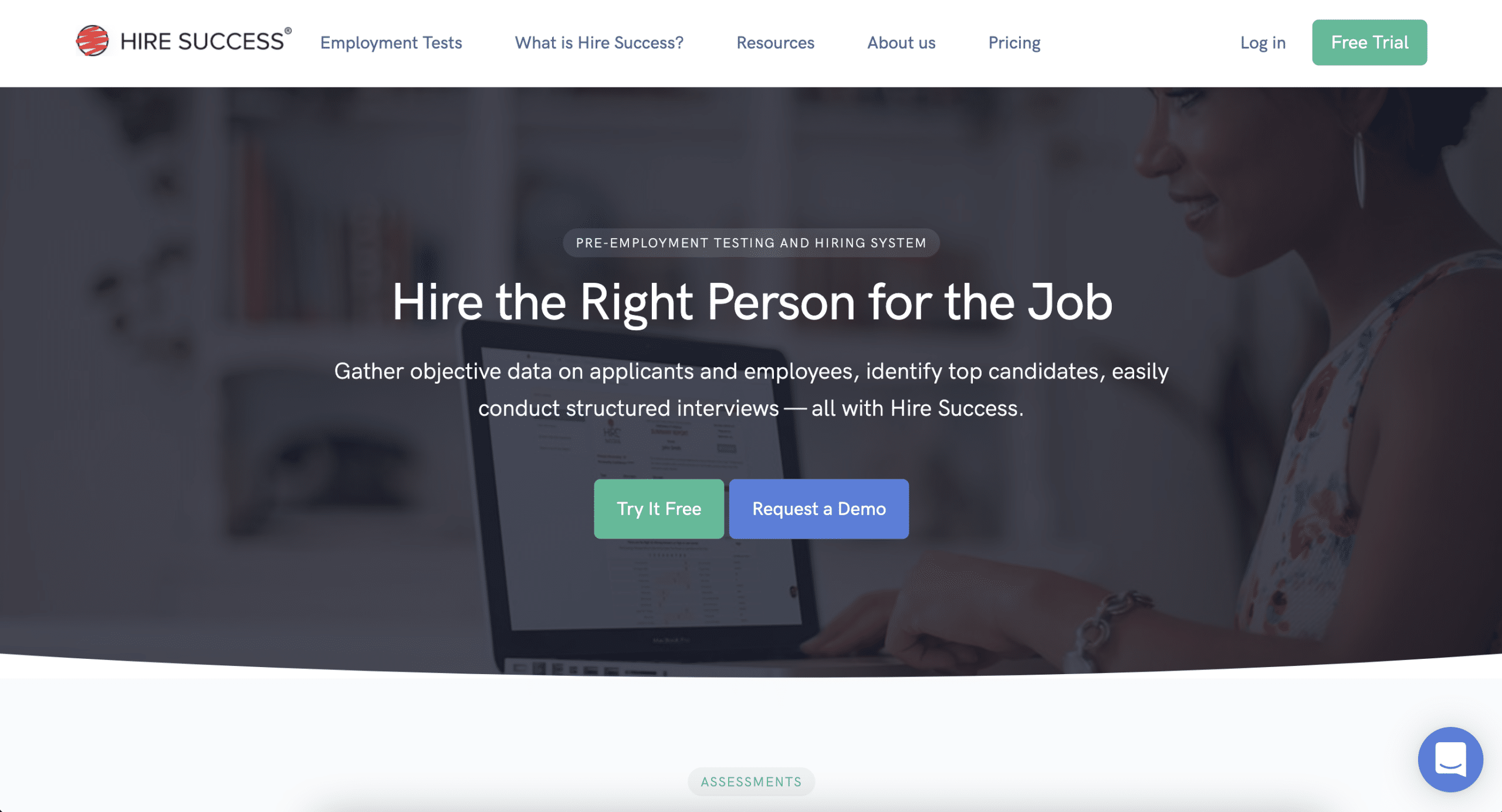
Compared to other AI tools on this list, Hire Success doesn’t use AI to score an assessment; instead, it uses it for “anti-cheating” monitoring while the applicant completes the skill test. Hire Success aims to measure recall knowledge, rather than practical, contextual, on-the-job skills. It’s not an immersive experience, but rather an aptitude test that uses multiple-choice, true-false or “yes-no” questions.
Unfortunately, recruiters have to manually score the results of each assessment. Hire Success’s machine learning acts as a proctor, notifying recruiters if a candidate leaves the testing window for any length of time, for instance.
Hire Success offers a number of different subscription plans, depending on how many candidates you are taking into your hiring processes.
Conclusion
AI has a number of different applications in the recruitment process. It can screen candidate data, parse resumes, engage in scheduling, and even manage the interview process. But, for recruiters seeking a way to quickly screen for the best candidates, AI assessment tools offer a big advantage.
When implemented correctly — meaning without human bias and to automate time-consuming aspects of talent acquisition — human resource management teams can ensure they interview the right candidates, screen people in, rather than out, and harness big data to ultimately retain candidates and employees for longer.




















